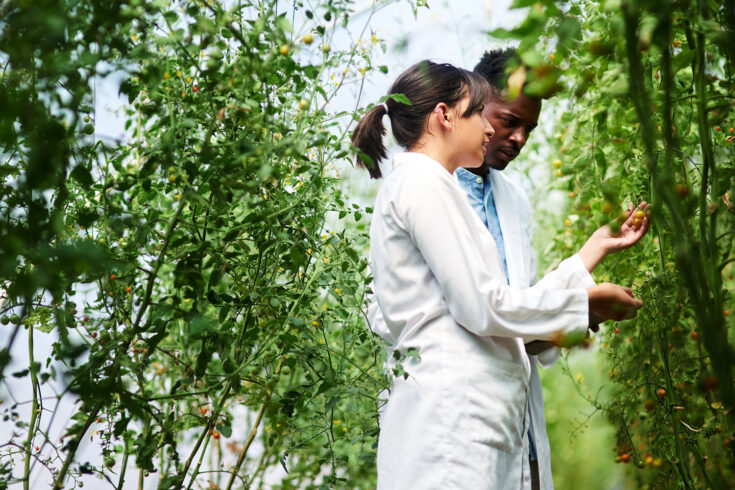Storytelling at the heart of UK Research and Innovation (UKRI) campaign, 12 plants celebrated in exclusive artwork and funding for plant health projects announced.
2020 will forever be known as the year of COVID-19. Yet, it was also International Year of Plant Health (IYPH).
Though the pandemic curtailed some planned activity, such as an exhibition garden at the Royal Horticultural Society Chelsea Flower Show, UKRI managed to deliver a packed programme of activity.
The United Nations (UN) General Assembly had declared 2020 as the IYPH. The UN described IYPH as:
A once in a lifetime opportunity to raise global awareness on how protecting plant health can help end hunger, reduce poverty, protect the environment, and boost economic development.
Practicing good biosecurity
Chief Plant Health Officer at the Department for Environment, Food and Rural Affairs (Defra), Nicola Spence, said:
As the IYPH draws to a close, now is an opportune moment to reflect on all the important activity and engagement work that UKRI and partners have undertaken to protect the UK’s rich heritage of trees and plants from pests and diseases.
During 2020 we have become more aware than ever of the importance of plants in our homes, gardens, allotments, balconies and public green spaces, they improve our wellbeing, provide environmental benefits including homes for wildlife, and help fight the climate crisis.
I would encourage everyone to continue to enjoy their plants, whilst ensuring that we keep them healthy by practicing good biosecurity.
The legacy continues
Professor Melanie Welham, Executive Chair of Biotechnology and Biological Sciences Research Council (BBSRC) said:
UKRI has been a proud supporter of the IYPH. Throughout the year we have highlighted the vital work that researchers are doing in this field and ran several calls to fund the research of tomorrow.
IYPH may be coming to an end soon, but its legacy will continue.
Telling plant health research and innovation stories
To raise awareness of the issues surrounding plant health, the centrepiece of UKRI’s campaign involved storytelling.
It published 10 blogs covering subjects such as How plants promote better mental health and wellbeing and Reducing climate change impact with plant science.
Stories were told visually as well. For each month of the year, a plant was selected including:
- the potato
- Himalayan balsam
- the ash tree.
For each plant, we collaborated with a different artist from across the country to produce a new piece of artwork.
Science was brought to life with the publication of impact stories across the year.
Readers learned how researchers were breeding striga-resistant rice, how a genomic atlas for wheat was created (John Innes Centre) and how machine learning was saving gardeners’ plants from pests.
New funding to support plant health
As well as storytelling, UKRI rolled out new funding for plant health projects. Eight projects shared £13 million of funding through the Strategic Priorities Fund to address bacterial pathogens that infect plants.
Funding includes two specific, far-reaching studies, one on oak tree diseases and the second addressing the UK’s urgent response to ‘Xylella fastidiosa’.
The second is led by the John Innes Centre, a highly infectious bacterium that is proving difficult to eradicate following outbreaks in continental Europe.
Studying Xylella fastidiosa
This project to study Xylella fastidiosa, the bacteria that causes olive quick decline syndrome, brought interdisciplinary scientists and researchers together from 12 organisations in the UK, and from across the UKRI portfolio.
This consortium worked with stakeholders from industry, and with the public.
This was to understand this devastating plant disease, it’s potential to spread if it ever reached the UK and raised awareness of key steps to ensure we keep plants healthy in the UK.
Of particular note was an animation, featuring an A-list celebrity. Dame Helen Mirren, who has seen the effects of Xylella fastidiosa first-hand, donated her time to record a voiceover (you can watch the animation on YouTube).
Two further calls launched
Two further calls were launched with grant holders to be announced in early-2021. Firstly the International Partnering Awards, the overarching aim of which is to provide resources to leading BBSRC-supported research groups.
The awards allow teams to forge long-term relationships with international scientists in areas of research that are of direct relevance to BBSRC’s current scientific strategy.
Secondly, the Tools and Resources Development Fund: Transformative Research Technologies call, which closed at the beginning of October.
The aim of this call is to support the early-stage development of cutting edge, high-impact transformative research technologies. These are essential to sustaining the vibrancy of bioscience discovery research in the UK.
Long term investment in plant health research
As the IYPH draws to a close, BBSRC’s long term investment in plant health research will continue into 2021 and beyond. This will be via the Plant Health Institute Strategic Programme (John Innes Centre), which was funded in 2017.
This programme is a collaborative research effort between the John Innes Centre and The Sainsbury Laboratory.
It aims to understand the molecular dialogue between plants and microbes, establishing how they communicate with each other and how they have evolved in relation to one another.
Understanding and being able to influence these interactions is crucial to increasing future crop productivity.
Top image: Credit: PeopleImages/Getty Images

